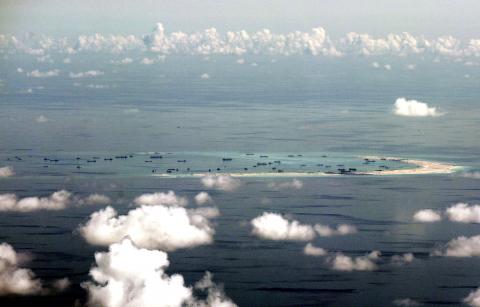China could use militarized islands in the South China Sea to stop the US from helping Taiwan in a crisis, a Washington conference was told.
The US is “quite concerned” the islands will increase China’s anti-access area-denial and general power-projection capabilities, said Bonnie Glaser, senior adviser for Asia at the Center for Strategic and International Studies (CSIS).
“This, of course, depends what equipment, what platforms China deploys,” Glaser said.

Photo: AP
Glaser said that potentially there could be surface-to-air missiles, anti-ship cruise missiles, manual and automatic aircraft and surface combatants.
She said runways would support refueling operations that would substantially extend the operational ranges of Chinese aircraft.
They could provide the capability to hold US forces at risk at a further distance than at present,” Glaser said.
A consultant for the US government on East Asia, she said US access to the region could be hindered if the US were seeking to defend Taiwan in a crisis.
“US ability to maneuver within the region would be potentially affected,” she told the fifth annual CSIS South China Sea Conference this week.
Glaser said that the most “prominent and problematic” development in the South China Sea over the past year had been China’s transformation of submerged or semi-submerged rocks and reefs into artificial islands.
She said the first Chinese objective was to assert sovereignty and administrative control.
Satellite imagery shows an “enormous amount of construction” and a good deal of it potentially for military facilities, Glaser said.
“This includes harbors, the very long runway — more than 3,000m — on Fiery Cross Reef [Yongshu Reef, 永暑礁], potentially hangers for aircraft — although I don’t think we have seen that yet — radars, other capabilities that will enable China to increase the size and the scope of its maritime presence.”
Taiwan also claims the reef.
Glaser said that China had about eight coast guard ships generally operating in the South China Sea at any given time and had limited capability to conduct intelligence, surveillance and reconnaissance.
However, “these would increase substantially with the use of these artificial islands, including electronic eavesdropping, potentially operating AWACS [Airborne early warning and control],” she added.
There is also the potential for China to establish an air defense identification zone, as it has done in the East China Sea, she said.
“It’s possible that, in order to monitor and enforce such a zone effectively, that China might really need more than one runway,” Glaser said. “Now it has one in the Paracels [Paracel Islands, Xisha Islands, 西沙群島] and will soon have one operational in the Spratlys [Spratly Islands, Nansha Islands, 南沙群島]. The satellite imagery of Subi Reef [Jhubi Reef, 渚碧礁, in the Spratlys] shows the potential for building another runway there.”
Taiwan also claims the Spratlys and Paracels.
She said that some people dismiss the military value of the artificial islands, because the islands would be vulnerable to attack in wartime.
However, “of course, in peacetime as well as in crisis, they do have potential value,” Glaser said.

The CIA has a message for Chinese government officials worried about their place in Chinese President Xi Jinping’s (習近平) government: Come work with us. The agency released two Mandarin-language videos on social media on Thursday inviting disgruntled officials to contact the CIA. The recruitment videos posted on YouTube and X racked up more than 5 million views combined in their first day. The outreach comes as CIA Director John Ratcliffe has vowed to boost the agency’s use of intelligence from human sources and its focus on China, which has recently targeted US officials with its own espionage operations. The videos are “aimed at

STEADFAST FRIEND: The bills encourage increased Taiwan-US engagement and address China’s distortion of UN Resolution 2758 to isolate Taiwan internationally The Presidential Office yesterday thanked the US House of Representatives for unanimously passing two Taiwan-related bills highlighting its solid support for Taiwan’s democracy and global participation, and for deepening bilateral relations. One of the bills, the Taiwan Assurance Implementation Act, requires the US Department of State to periodically review its guidelines for engagement with Taiwan, and report to the US Congress on the guidelines and plans to lift self-imposed limitations on US-Taiwan engagement. The other bill is the Taiwan International Solidarity Act, which clarifies that UN Resolution 2758 does not address the issue of the representation of Taiwan or its people in

US Indo-Pacific Commander Admiral Samuel Paparo on Friday expressed concern over the rate at which China is diversifying its military exercises, the Financial Times (FT) reported on Saturday. “The rates of change on the depth and breadth of their exercises is the one non-linear effect that I’ve seen in the last year that wakes me up at night or keeps me up at night,” Paparo was quoted by FT as saying while attending the annual Sedona Forum at the McCain Institute in Arizona. Paparo also expressed concern over the speed with which China was expanding its military. While the US

SHIFT: Taiwan’s better-than-expected first-quarter GDP and signs of weakness in the US have driven global capital back to emerging markets, the central bank head said The central bank yesterday blamed market speculation for the steep rise in the local currency, and urged exporters and financial institutions to stay calm and stop panic sell-offs to avoid hurting their own profitability. The nation’s top monetary policymaker said that it would step in, if necessary, to maintain order and stability in the foreign exchange market. The remarks came as the NT dollar yesterday closed up NT$0.919 to NT$30.145 against the US dollar in Taipei trading, after rising as high as NT$29.59 in intraday trading. The local currency has surged 5.85 percent against the greenback over the past two sessions, central